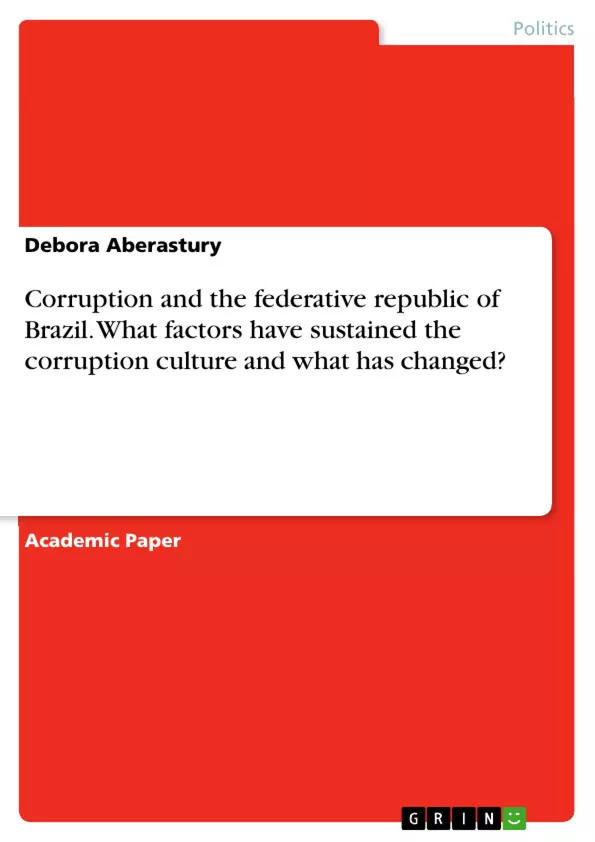In this paper, I will argue that there has been a "corruption culture" that has been accepted as the "norm" within the fabric of Brazilian society. I will argue that the mentality of "Rouba mas faz" ("he or she steals, but get things done") and the political structure have sustained this "culture". I will also argue that there has been a recent switch on tolerating corruption in the past five years. And that the recession, increases in investigations, general visibility and bad governance have threatened the sustainability of the corruption culture. My primary case will be Operation Car Wash, with the Mensalão scandal and former President Collor’s impeachment as secondary cases.
Brazil was once synonymous with economic growth and potential, all factors pointing at global powerhouse potential. It is a country abundant with natural resources, with the 8th largest economy, largest country in the region, 6th most populous in the world, and part of the BRICS bloc. The recent years have set Brazil back, from entering into a recession dubbed the worse of its history to civil society protesting in the millions to impeaching its sitting president to most notably of all— entering and still in progress of a corruption scandal, classified as one of the largest corruption scandals in modern history.
Inhaltsverzeichnis (Table of Contents)
- Introduction
- Argument
- Political Landscape of Brazil
- 'Rouba mas faz' Mentality
- Political Structure
- Economic Development from the Real Plan of 1994 to 2013
- The Real Plan of 1994
- Commodities Boom of 2000's and Bolsa Familia
- End of Commodities Boom and Economic Actions of 2010's
- Protests of mid-2013
- Lingering Effects of Bolsa Familia on the 2013 Protests
- Height of the 2013 Protests
- Effect of Mensalão on the Protests
- Increased Transparency and Communication
- A Break in Protests
- Organized Crime Law of 2013
- Increased Transparency from the Government
- Conclusion
- References
Zielsetzung und Themenschwerpunkte (Objectives and Key Themes)
This paper investigates the 'corruption culture' in Brazil, examining the factors that have sustained it and recent changes that have impacted it. The author aims to argue that the 'Rouba mas faz' mentality and political structure have historically contributed to the acceptance of corruption in Brazilian society, but recent developments like the recession, increased investigations, and public scrutiny are undermining this culture.
- The persistence of a 'corruption culture' in Brazil.
- The role of the 'Rouba mas faz' mentality in perpetuating corruption.
- The impact of Brazil's political structure on corruption.
- The influence of economic factors on corruption.
- Recent changes in attitudes towards corruption in Brazil.
Zusammenfassung der Kapitel (Chapter Summaries)
The introduction outlines the current situation in Brazil, highlighting its economic challenges, political turmoil, and ongoing corruption scandals. The author introduces Operation Car Wash, a massive corruption investigation that has implicated many high-profile politicians and businesses.
The argument section presents the central thesis: there has been a 'corruption culture' in Brazil, fueled by the 'Rouba mas faz' mentality and a political structure lacking accountability. The author argues that recent changes, including the recession and increased scrutiny, are impacting this culture.
The 'Political Landscape of Brazil' chapter explores the two main factors that have historically sustained the 'corruption culture' - the 'Rouba mas faz' mentality and the political structure. The author examines studies that explore voter behavior and the influence of public goods in accepting corrupt politicians.
The 'Economic Development from the Real Plan of 1994 to 2013' chapter examines the economic history of Brazil, focusing on the Real Plan, the commodities boom, and the subsequent recession. The chapter also explores the impact of social programs like Bolsa Familia on the 2013 protests.
Schlüsselwörter (Keywords)
The key terms and focus topics in this text include 'corruption culture,' 'Rouba mas faz,' 'Mensalão scandal,' 'Operation Car Wash,' 'Bolsa Familia,' 'political structure,' 'economic development,' 'Brazilian politics,' and 'public perception.'
Frequently Asked Questions
What is the "Rouba mas faz" mentality in Brazilian politics?
It is a Portuguese phrase meaning "he or she steals, but gets things done," reflecting a historical social acceptance of corrupt politicians as long as they deliver public works or economic growth.
What was "Operation Car Wash" (Operação Lava Jato)?
It is one of the largest corruption investigations in modern history, uncovering a massive money-laundering scheme involving the state oil company Petrobras and high-level politicians.
How did the 2013 protests change the perception of corruption in Brazil?
The protests marked a significant shift in public tolerance, leading to increased demands for transparency, better governance, and the passing of the Organized Crime Law of 2013.
What is the Mensalão scandal mentioned in the paper?
The Mensalão was a vote-buying scandal in the early 2000s where monthly allowances were paid to members of congress to support the government's legislative agenda.
Why did the economic recession threaten the "corruption culture" in Brazil?
As the economy declined, citizens became less willing to tolerate the "Rouba mas faz" trade-off, leading to millions protesting and demanding accountability for stolen public funds.
What role did the "Bolsa Familia" program play in the 2013 protests?
While the program successfully lifted many out of poverty, the paper explores how lingering dissatisfaction with public services despite social programs contributed to the scale of the protests.
- Citation du texte
- Debora Aberastury (Auteur), 2018, Corruption and the federative republic of Brazil. What factors have sustained the corruption culture and what has changed?, Munich, GRIN Verlag, https://www.grin.com/document/913182



